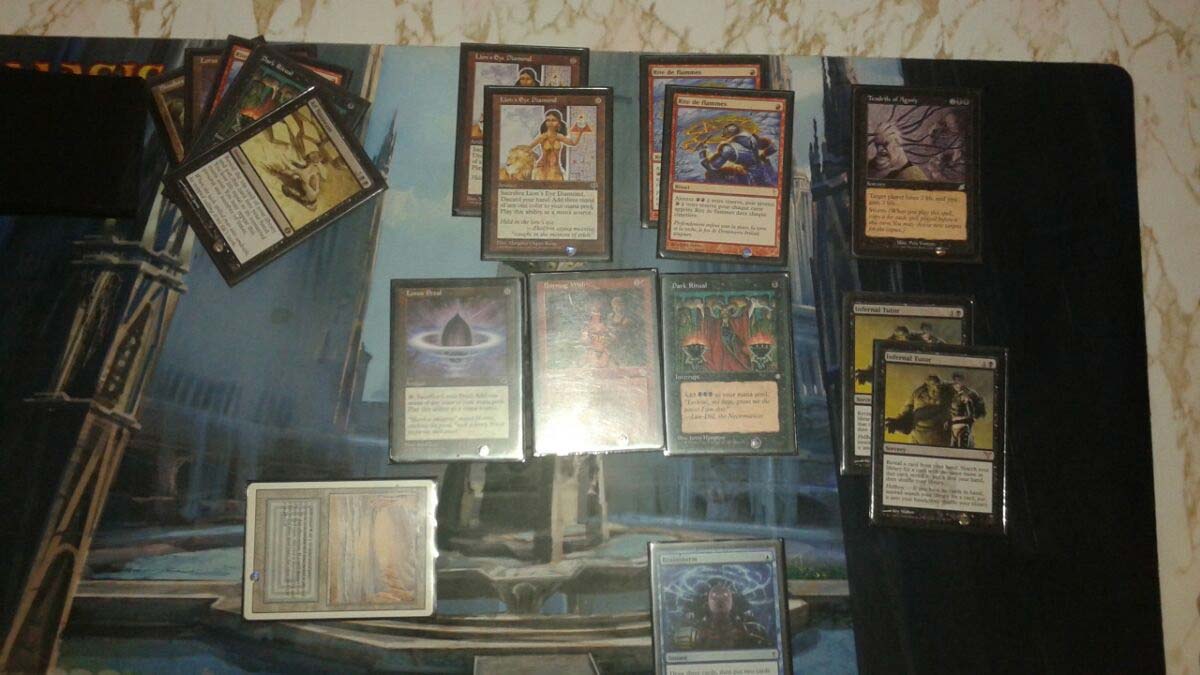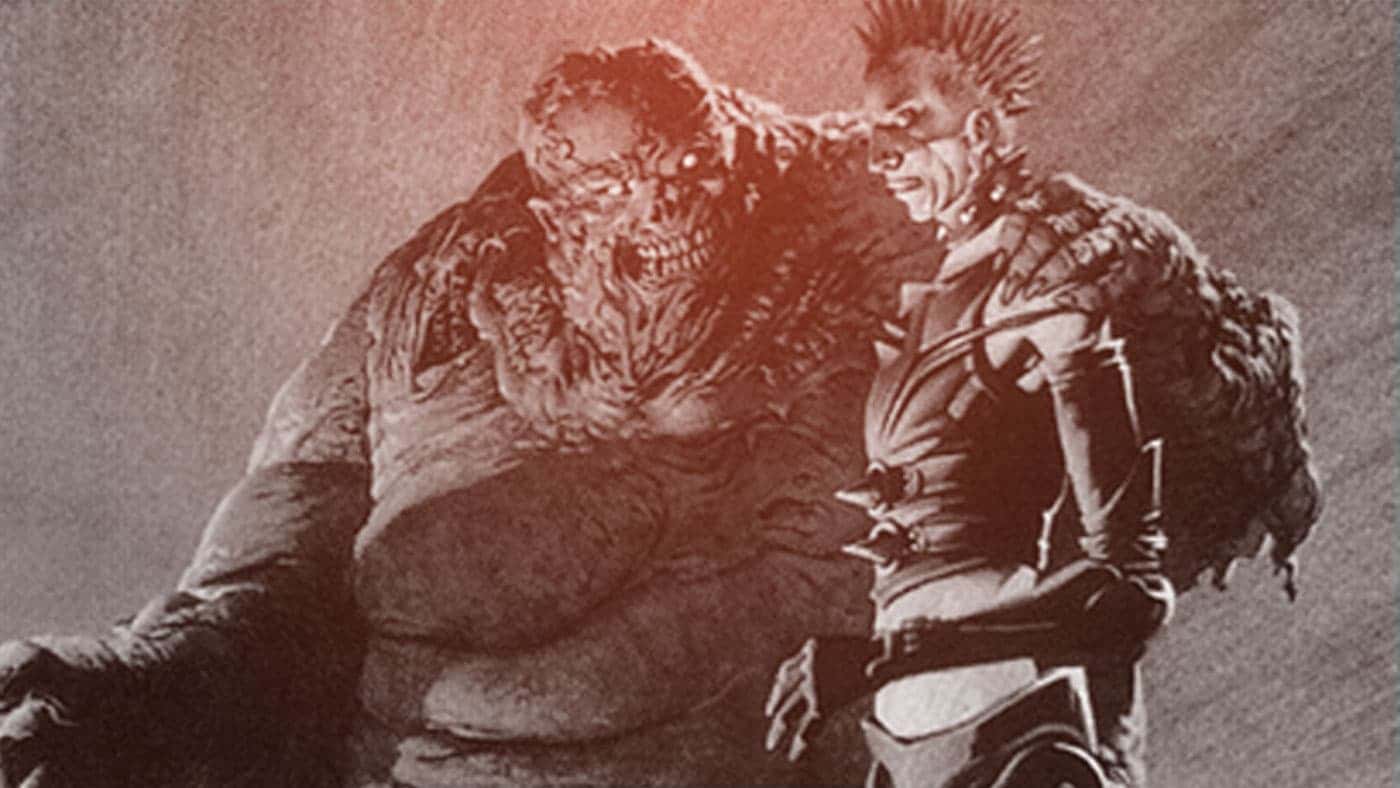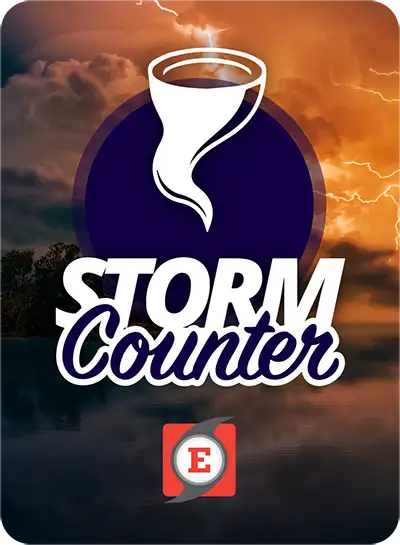For these situations, the same deck list as usual was used, which is now a bit different than the suggested one on the website.
Main Deck
- 4 Burning Wish
- 4 Infernal Tutor
- 4 Brainstorm
- 4 Ponder
- 4 Gitaxian Probe
- 4 Cabal Therapy
- 2 Duress
- 1 Empty the Warrens
- 1 Ad Nauseam
Sideboard
Situation #1 - Shardless BUG
Without a local game store, the card availability is rather slim on the island, so once you buy a deck, you intend to play it for a long while. That's why I know a bit what to expect when I face my friend playing his BUG list. We're game 2, on the draw. I sided in Tendrils of Agony for Empty the Warrens and leave it like that. Bruno has a Deathrite Shaman in play. As I know he doesn't run Daze and is left with 5 cards in hand, I try my luck to combo on turn 1, from Bloodstained Mire, Lotus Petal, Rite of Flame, Dark Ritual, Ad Nauseam. It doesn't meet resistance. I draw a ton of discards and cantrips from Ad Nauseam and the following relevant spells before I drop to 2 life.Please excuse the non-pimped cards.
 EDITOR'S NOTE: You may click on the images to enlarge for better viewing.
EDITOR'S NOTE: You may click on the images to enlarge for better viewing.

I was only asked about a non-Past in Flames win after the game was over. I managed to win the game by playing the Lotus Petal, the pair of Rite of Flame, both Lion's Eye Diamond, Burning Wish holding priority for Lion's Eye Diamond (RRRBBB), Past in Flames, cast all the rituals again and Tendrils of Agony for lethal.
Using Infernal Tutor after the Ad Nauseam could have been useful if we needed an overkill, but I had the win secured at that point. I knew I had to win that specific turn, because at two life and with a Deathrite Shaman in play, I would have died in the next upkeep.

It is not possible to win the game without Past in Flames with the exception of a really strong Brainstorm. First, there are a few mental shortcuts that we can take to show this. One is that, at most, we can produce 6 red or 3 black mana and cast a Tutor that gets our storm count to 10 or 9 respectively. With Infernal Tutor, we could then only find Past in Flames. With Burning Wish, we can find Empty the Warrens which doesn't win this turn, Grapeshot which isn't lethal yet, or Dark Petition. We know that, to win without Past in Flames, we definitely have to use the Lion's Eye Diamonds which will put the Tendrils of Agony out of reach from anything that isn't Past in Flames, so Grapeshot has to be our win condition. If we got up to 6 red, use two to Cast Burning Wish and then add 6 black, we can find Dark Petition, which puts us from 10 mana to 8, and we can then chain three straight tutors into Grapeshot, but this leaves us with the ability to do only 15 damage. To have our Brainstorm win the game off of the Lotus Petal, we would need to find two initial mana sources (Lotus Petal or Chrome Mox) to allow us to replace the Lotus Petal and provide us with an additional mana. Even another Rite of Flame falls a bit short of being good enough. With two initial mana sources though, we can easily use the Infernal Tutors to chain into 20 storm for the Grapeshot, so casting Brainstorm is your best bet if your opponent accidentally dropped Ravenous Trap from his hand before passing the turn.

I don't see an option to win immediately without Past in Flames, with your only Tendrils of Agony in hand rather than in the deck or sideboard to tutor for it in a lethal spell-chain.

I don't see why you just wouldn't use the Past in Flames? Winning the game without it would mean that your Brainstorm has to be nuts, probably two initial mana sources (Chrome Mox and Lotus Petal). Your win condition would then become Grapeshot if you for some reason can't access the Past in Flames.
Situation #2: Aggro Loam
This is an evalution of asset and general value of resource. This is game three against a typical Aggro Loam deck. I lost the first one and won game two, thus I'm on the draw and my opponent mulligans to 6. Following the sideboard guide, I brought in +4 Abrupt Decay, +2 Hurkyl's Recall, +2 Thoughtseize, +1 Bayou and removed -4 Cabal Therapy, -2 Ponder, -2 Duress, -1 Chrome Mox. I keep a hand full of mana: Rite of Flame, Rite of Flame, Dark Ritual, Dark Ritual, Lotus Petal, Bloodstained Mire, Abrupt Decay. My opponent begins the game with a Savannah, Mox Diamond into Gaddock Teeg and I draw Infernal Tutor on my turn. While I could use the Lotus Petal and the land to destroy the legendary creature, I choose to wait: I believe my opponent could be holding on more hate if he feels confident with Gaddock Teeg. So I pass after my land. In their second turn, my opponent drops a Wasteland and tap Savannah, Mox Diamond to play Dark Confidant, then proceed to attack. I value my Lotus Petal over 2 life and drop to 18. I draw a Polluted Delta for my second turn, lay it down and pass. My opponent draws, play Bojuka Bog and move right away to attack step. Trusting the deck, I believe I must take the Gaddock Teeg this turn with Abrupt Decay and proceed to Infernal Tutor on my next main phase, the probability of being Hellbent being quite good. However, I don't know if I should destroy it before the damage is dealt, or at the end step, when I would be sure nothing worse would come down. What would you value the most between 2 extra life for Ad Nauseam and the assurance of having nothing else to Abrupt Decay? A second question could be what mana to use to pay for Abrupt Decay. If we search for Swamp + Bayou and leave the Lotus Petal there, if the next draw prevents Hellbent, we could be one land short off to use for various things. However, nothing struck me when I was playing, I just chose to trade Wasteland for Bayou and keep the Lotus Petal safe without second guesses. I would do the same thing again.
I would argue that if we should care about 2 life that much, the best play would have been to take out the Gaddock Teeg with Lotus Petal and a Swamp, before it delivered its first attack. However, I don't think it makes that much of a difference when you go from 18, 16, or 14 with Ad Nauseam. Most of the times 14 life should be enough.
I'll take the extra information and see if I should save Abrupt Decay for anything else, wait on it, or use it for Gaddock Teeg before my turn. In this case, I chose to Swamp + Bayou and Abrupt Decay Gaddock Teeg. I lost my Bayou to Wasteland, but could manage to win the following turn with the Swamp and Lotus Petal as mana.

We will almost certainly have to kill the Gaddock Teeg before we can combo off anyway, so then the question is, what makes killing it now bad? The answer is a second Gaddock Teeg, a Green Sun's Zenith, a Thalia, or a Trinisphere (which is bad because he can put us below three mana if we go for it now), but Aggro Loam almost never plays Trinisphere in my experience. If we are hit by Thoughtseize in main phase two, it sucks, but we would respond to that with Abrupt Decay anyway if we held it, because we have more tutors left in our deck than we do answers to Gaddock Teeg. All that said though, this is all assuming our opponent doesn't just play Dark Confidant in main phase 1. Since he did, we know that it is almost impossible for our opponent to do anything else meaningful this turn, so just kill it in combat and move on with two extra life.
If he had waited on the Dark Confidant and went to combat with all of his mana up though, I don't believe two life matters more than the chance that our opponent could have access to another Gaddock Teeg. Also, if they cast a Thalia in main phase two, there is a good chance we have to bite the bullet and Abrupt Decay that first. Also, if we draw a card that fails to let us go hellbent next turn (its own set of issues but also fairly unlikely), then we still won't be that disappointed that we killed a Gaddock Teeg that would have had to die eventually. Anyway, at minimum we will have 6 mana after casting Infernal Tutor next turn (if we draw a discard spell we have to use mana for), means that an Ad Nauseaum would leave us with a land drop and a mana floating at minimum. There are some draws that allow us to naturally cast Tendrils, but that is not worth considering since we win anyway. So, if we are using Ad Nauseam with at least two mana floating most likely, the two extra life shouldn't matter all that much since it is a fairly low percentage that we lose from 13 or 14 with that much mana floating. As for the follow up, I want to keep Lotus Petal in play so that we can guarantee our ability to cast any blue spells that we might draw to keep us on hellbent, as well as guarantee that we will have red mana next turn.

I would wait for end of turn in order to see, if additional hate comes down or the opposing Wasteland is used for a spell instead of threatening one of your lands. The 2 lost life are not an issue, as the mathematical sweet-spot for successfully killing with Ad Nauseam (with that kind of list, black+red float, 5 initial mana sources as well as 4 Lions Eye Diamonds in the deck and 7 Tutors/Wishes left in the library) is about 9-10 life at the point you cast the instant.

In the first turn, I would lay down Bloodstained Mire and Lotus Petal. I would take the attack from the Gaddock Teeg and not destroy it on the end step. The reason being is your options are now to cut yourself off of "off" colored mana by getting the Swamp or to open yourself up to Wasteland. On your turn, you draw a land - you can win now. You play the land, both pairs of Dark Ritual, both copies of Rite of Flame (Mana in pool is now: RRRRBBBBB) and then Abrupt Decay using the Lotus Petal for green mana (Mana in pool is now: RRRRBBBB). Cast Infernal Tutor for Ad Nauseam floating a red. As for the question because you waited: I would probably Abrupt Decay before combat, because if they have a secondary hate piece - you likely lose the game. As for the mana, it doesn't really matter as long as you end up with Swamp + Lotus Petal on the following turn.
Situation #3: General Advice
And since this is the season finale, here is a treat... a question I was asked to submit to the Infernal Tutors. A reader would like to know how to choose the win conditions to close a game. He is having troubles with the use of Dark Petition and Past in Flames, mostly. In other words, given the choice, what method would you use to win a game. Here is a relevant quote: ''I think my main issues would be properly classified as sequencing. Really pre-sequencing. Evaluating what is required to be in your graveyard and/or what is required to be in your hand/floating in order to pull off a kill. This is especially true when potentially facing things like Deathrite Shaman on-board (since they can eat a card and throw all the calculations out the window) or a potential counter in-hand.'' I've myself been in a situation where I was asked post game why I went for Past in Flames instead of Dark Petition. Both were lethal options, but I completely missed the Dark Petition line, I didn't even consider it, nor noticed it was a possible play. To prevent a scenario where these priorities (hierarchy?) would matter, I'm also interested in the answer.
It's for sure a difficult question because cards like Past in Flames and Dark Petition can both serve in deterministic and non deterministic wins. For instance, if your Past in Flames is just a piece in your storm count and you know you'll win once it resolves, it feels determined to me.
If I had to explain how my thought process works when choosing a win condition, I would split the options as follow: deterministic Tendrils of Agony (something that you can calculate from start to finish), deterministic Empty the Warrens, unknown Tendrils of Agony (requires a variable to be favorable, such as a cantrip or Ad Nauseam), unknown Empty the Warrens, extras (such as Grapeshot, or Tendrils of Agony, pass the turn, Past in Flames, so a win over two turns.)
Once your option is decided, you then use the necessary tools to achieve your goal and take into account the opponent's counters. It's totally possible to have a deterministic Tendrils of Agony kill that doesn't require anything, or one that uses Past in Flames, Dark Petition, or both. To me, it's all in the same category if the result is a lethal storm count. I try to see if the lethal storm count is possible first with all the tools I could use, from a ritual chain, an Infernal Tutor/Burning Wish chain, a Past in Flames use, or a Dark Petition, or anything else. I don't have a prepared sequence for that (maybe I should?), I just try to see with what I have in hand and what the situation is asking from me, from dodging counterspells to preemptive discard, or preparing against Deathrite Shaman. If that option is not available, I move to the next.
However, while they're in order as a thought process, it doesn't mean that I would always go for a deterministic Empty the Warrens over an unknown Tendrils of Agony, for instance. It means that I need to think about it first. In many cases, I'll think like that: ''I can't surely use Tendrils of Agony for lethal this turn, I could Empty the Warrens with tutors for 16 goblins, however, the deck I'm facing as strong counters to that, so I need to move on to the next option: unknown Tendrils of Agony.'' Because an option is available doesn't mean it is a good one.
The most important part is the first decision you make. Going for a deterministic Empty the Warrens, despite it being close to the top of my list, could be fatal depending on the opponent deck. This crucial decision is also the part with which I struggle the most and I would suggest you read the website to see against which deck these different options are the best. Then, when you enter the unknown variable realm, an infinite number of possibilities exist and only a case by case experience can help you. Who knows if you should Ad Nauseam at 12 life, when you played XYZ previously? Just note what decision you made and what was the result, try to learn from experience.
Then as a final note, I could say that I look for resource sparing first, which means, given the choice, I'll avoid using Dark Petition or Past in Flames if the same result can be obtained without them. That way, if something happened that I couldn't win the game with the previous plays, these cards would be available if I could recover.
I hope it made sense and answered your question!

The first thing that I think any storm player should do to approach this problem is master the mental shortcuts. Know that Rite of Flames cast in sequence put you to 2 mana floating, then 4, then 7, then 11. Know that Dark Ritual is always just +2. Little shortcuts like that make doing calculations for comboing off so much easier. In general, barring any corner case situations, Past in Flames is only better than Dark Petition when Dark Petition, deterministically, doesn't win the game, or when you somehow get a Burning Wish to resolve but have so much mana that you can play around a counter spell by playing and flashing back Past in Flames if necessary, or when you need the extra storm count that Past in Flames provides. Other random things like having Tendrils in your graveyard because you sideboard it in and discarded it to L.E.D. happen, but are less common. First, let's figure if Dark Petition can win without just using it to find Ad Nauseam (which is then better than Past in Flames still if Past in Flames doesn't win the game). Figure out all the mana you have after casting your Burning Wish, then subtract two for casting Dark Petition.
Now, look at how much mana you have floating and what your storm count is. For every mana you have in excess of six, you can spend two to generate an additional storm by finding an Infernal Tutor. If, after spending this excess mana all the way down to 6 (or 7) mana floating, you now have cast 8 spells (or 1 less for every two damage your opponent has already dealt to themselves), you use the last tutor currently resolving to find Burning Wish and then use your last 6 to cast Burning Wish and then Tendrils of Agony for 10 mana. The two mana for a storm shortcut is important to remember for making the math easier. Figuring out exactly whether or not Past in Flames wins the game could probably have its whole own article, so I won't go into all of the possibilities here, but just remember that Burning Wish for Past in Flames only really does anything most of the time if you already have another tutor in your graveyard since you can't flashback a Burning Wish that has resolved.
Essentially, just figure out how much mana you would have after casting Past in Flames and imagine that your instants and sorceries in your graveyard are now your hand. Can this hand win with Tendrils from where you currently are in terms of mana and storm? Well, that's for you to figure out! After talking about all this, I kind of want to write an article about winning with Past in Flames and Dark Petition!

I want to thank you for this question first, as it addresses the common displayed focus of new players on the simple play lines of Infernal Tutor into Ad Nauseam or Burning Wish into Empty the Warrens, missing so many possible play lines and guaranteed wins for gambling on the survival of Tokens or Ad Nauseam flip, while other pilots are confused, due to all the options to choose from.
There are some easy-to-remember rules, I set for myself years ago and would like to share here. #1 - Your starting hand is dictating which route to victory you should go for. If you have 6 mana, Burning Wish its usually advised to go for the goblins rather than wait for the safe Ad Nauseam (this also is true if your opponent MIGHT run answers to the goblins). #2 - Your opponents deck/plays will rule out traits. Once your opponent drops Deathrite Shaman, going for Past in Flames doesn't make much sense. The same is true if you try to sculpt an Ad Nauseam, while your opponent is dropping your life points fast with Delver. If your opponent casts Mother of Runes or Aether Vial off a Plains indicating to be on Death & Taxes, you can't afford to slow roll with sculpting a hand, but have to get going immediately (often meaning: Empty the Warrens).
The knowledge of your opponents deck will also affect the mulligan decisions, if your starting hands strategy (rule #1) is weak to your opponents game plan (rule #2). #3 - Choose the winning path with the least variance. Plenty of people miss out simple, lethal play lines in order to cast Ad Nauseam with floating mana on the stack without noticing, that their Rituals/Rites already delivered enough storm count to simply chain cantrips, Tutors, Wishes, Past in Flames and/or Dark Petition into Tendrils of Agony instead. Its some sort of tunnel vision of how good Ad Nauseam is with floating mana, that people do not even consider alternatives anymore at a certain point. Remember: The Tutors/Wishes allow you to exchange extra mana for additional storm count at any time, so if you have tons of mana and a Burning Wish, you don't have to gamble on a small Empty the Warrens or Dark Petition into Ad Nauseam, but can chain Burning Wish - Dark Petition - Infernal Tutor - Burning Wish - Tendrils of Agony instead and sidestep all variance possibly occurring with the other options used.

I'm not going to try to reiterate what the other two have previously stated. My advice is lots of repetitions and jamming games, you get a natural feel of when to go for it and what lines and more importantly - in what match-ups. Experience will help a lot more than things often said on the internet, it just typically hits home a little harder. When you make a mistake, don't shrug it off immediately - remember it and strive to do better the next time you're in a similar situation.










